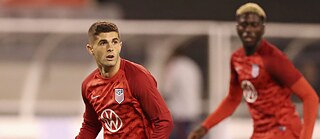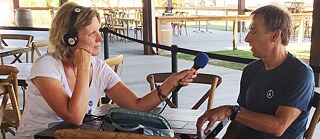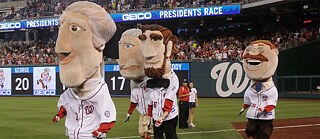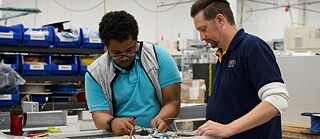Globaler Austausch
U.S.-American Soccer and the World
Seit die Herren-Fußballnationalmannschaft der USA sich nicht für die Weltmeisterschaft 2018 qualifizieren konnte, haben viele US-amerikanische Spieler ihre Fähigkeiten im Ausland verbessern können. Das lässt auf eine vielversprechende Zukunft für diesen Sport in den USA hoffen.
Diese Folge anhören: Apple Music | Spotify | Download
Diese Folge stammt von Rob Sachs. Rob arbeitet seit 2000 für den US‑amerikanischen Hörfunk und produzierte NPR‑Sendeformate wie „All Things Considered“. Er war Produktionsleiter von „America Abroad“, einer Dokumentarreihe auf Public Radio International. Rob lebt mit seiner Frau und drei Kindern in Maryland. In diesem Podcast unterhält sich Rob mit Fußballexpert*innen. Das Foto zur Folge zeigt den deutschen Fußballer Christian Pulisic, der für die US‑Nationalmannschaft spielt. Außer dieser Episode hat Rob Sachs die Folge „Hessian Barracks in Maryland“ produziert.
Transkript
Rob Sachs: For the last few years the US Men’s soccer team has been itching to prove itself. In stunning fashion, it failed to qualify for the 2018 World Cup. The low point, when they accidentally scored on themselves — something known as an own-goal. This happened during their loss to Trinidad and Tobago.
[COMMENTATOR ANNOUNCES OWN GOAL]
Mike Woitalla: Yeah, I mean the US failing to reach the 2018 World Cup was really a perfect storm of mishaps.
Rob Sachs: That’s Mike Woitalla.
Mike Woitalla: I’m the executive editor of Soccer America. I mean it was unbelievable. I didn’t believe it until all three games ended, that effected that result. I do believe it was a fluke in many ways.
[COMMENTATOR: “UNFORTUNATE FOR THE UNITED STATES AND UNFORTUNATE FOR TIM HOWARD, BUT NOW ALL OF SUDDEN THE US IN TROUBLE ...”]
Mike Woitalla: But it was also a bit of a wakeup call that we had to re-evaluate what was going on.
Rob Sachs: But this isn’t a story about American soccer being bad. In fact, most experts agree: American soccer is getting better, and they’ve benefitted greatly from a source you might not expect. Europe and specifically Germany. This may seem like a bit of an odd choice since it was actually a German coach, Jürgen Klinsmann, who was in charge when the US team failed to qualify.
Mike Woitalla: I think Jürgen Klinsmann set us back in a serious way. I don’t think he was a very good coach.
Rob Sachs: It turns out Germany’s big contribution to US soccer has been more through what they’ve been importing rather than exporting. A slew of American stars has been developing their games in the Bundesliga, Germany’s professional soccer league, including the biggest star in the US. This is part of a larger trend of American soccer growing stronger through exposure to world soccer. So despite the big disappointment with the 2018 World Cup, Woitalla actually sees a bright future for soccer in America.
Mike Woitalla: It’s very hard for me to imagine that the US will ever not qualify for the World Cup. I mean everything does point towards an improvement.
Rob Sachs: Phillip Gyau agrees. Originally from Ghana, he was a member of the US men’s national team from 1989 to 1993, an era when Team USA got very little respect.
Phillip Gyau: Back in the old days, like when I was playing, we used to play against like club teams. We would play against Benfica, Bayern Munich, and things like that. I mean I played so many games like that, but things have gotten so much better from back when I was playing, you know. Anyone that says that it hasn’t, just would not be telling you the truth.
Mike Woitalla: I think the question is, when will we compete to actually win the World Cup.
Rob Sachs: Mike Woitalla says changes began happening in the 80s, when participation in youth soccer skyrocketed. And then came the 90s and two major events. First was 1994 when the United States hosted the FIFA World Cup.
[COMMENTATOR: “SCORE! USA!”]
Rob Sachs: And then 1996 saw the debut of Major League Soccer.
[COMMENTATOR: “THE WORLD CUP PROVIDED THE SPARK, AND NOW IT’S TIME FOR THE WORLD GAME TO TAKE ITS NEXT STEP IN THE UNITED STATES. THE BUILDING BLOCKS HAVE BEEN LAID FOR THE MOST AMBITIOUS COAST-TO-COAST PROFESSIONAL LEAGUE IN AMERICAN HISTORY.”]
Mike Woitalla: You saw soccer becoming very mainstream and part of that too was that you didn’t have a situation where you had in the past where people weren’t familiar with it. You had kids who grew up playing it, and they were likely to become fans, and you had something to become fans of. You had an incredible proliferation of soccer on television.
[SOCCER CHEERING]
Rob Sachs: It was also during the 90s when many of the current players of the US men’s national team were born. Including its star midfielder, Christian Pulisic.
[COMMENTATOR: “HERE’S ON SIDE HERE AND CAN FINISH AND HE DOES FINISH, IT’S PULISIC FOR THE USA. WHAT A STAR!”]
Rob Sachs: Christian Pulisic grew up in Hershey, Pennsylvania. That’s where he first met Steve Klein, the academy director for the Pennsylvania Classics, the local US Soccer Development Academy Club.
Steve Klein: I’ve also worked the last eight or nine years with youth national teams as an assistant coach. I've known Christian and his family since he was a little kid, you know, 4, 5, 6 years old. I used to play with the Hershey Wildcats, which was in the old A league, and his dad was around the area coaching college. So he got Christian involved in our club at an early age of 5 or 6 years old and Christian's dad Mark actually ran our little Kiddie Kickers program.
Rob Sachs: I asked Steve if Christian’s greatness was evident from an early age. His answer? Not really.
Steve Klein: I think when kids are, are young, you know 10, 11, 12, even 13. I mean you can always tell which players are better than other players, but there's so much that goes into what makes a player a professional or even a European professional that no one really can predict it at those ages.
Rob Sachs: But as he became a teenager, Pulisic did start to separate himself from his teammates in Pennsylvania.
Steve Klein: He did get involved at the national team at the U-14 age group so obviously any kid that's making a national team, or the player pool of a national team at U-14, they obviously have some talents and qualities but you never really know who's going to make it through once they start at that level.
Rob Sachs: It turns out what enabled Christian Pulisic to make a huge leap is that he had something most other Americans didn’t: a European passport. There’s a rule in FIFA that foreign players are not allowed to be signed to play in European leagues until they turn 18. Though there’s an exception if the player’s parents are European. This is how a young Pulisic was able to be signed to Dortmund, a team in the German Bundesliga.
Mike Woitalla: He was able to go before he was 18 because he had a Croatian passport, that’s a rule that you have in FIFA, in world soccer you can't sign a player under 18. He who was able to go there when he was 16. He went with his father. He learned German very quickly, so he adapted. He impressed the coaches. Because you have to remember that they’ll sign, you know 10 of these kids or 15 of these kids. So it’s really competitive. And he was able to make the adjustments to handle whatever challenges he had, and maybe his game, his style of play was suited for the German game. He’s a very quick player, and Dortmund really, I think, believed in him and gave him the chances to break through.
Steve Klein: Dortmund really just kind of put some more fuel on the fire and just really accelerated his growth because they gave him an opportunity to play.
Rob Sachs: Christian Pulisic quickly rose through the ranks of Dortmund and at the age of 17, when most of his peers were just getting their driver’s licenses, he broke through to play on Dortmund’s senior team. Then in just his seventh game, he scored his first goal playing against Hamburg.
[COMMENTATOR: “PULISIC! AND THERE A STAR IS BORN, HIS VERY FIRST GOAL. IN THE FIRST TEAM NOW, THE FOURTH YOUNGEST SCORER EVER IN THE BUNDESLIGA.”]
Rob Sachs: Former US Men’s National Team player Phillip Gyau says his son Joseph was also recruited to play in Germany.
Phillip Gyau: They then put him on loan to go to Vancouver because he couldn’t play in Europe until the age of 18 so he had to go and sit in Vancouver for a couple of years before he could actually go and play in the Bundesliga under 19. He then went on to play for Hoffenheim and then even at Dortmund.
Rob Sachs: The experience was transformative for Joseph.
Phillip Gyau: He started getting better immediately after he went to Germany because they’re able to work on tactics. You’re constantly playing against better players, competition every week in and week out, you have to compete for play. And you’re on the ball every day, sometimes twice a day, a lot of times. And basically you’re practicing every day with just a couple of months off. So you can’t help but get better.
Rob Sachs: And Gyau says had Joseph continued playing in the United States, he most likely would have had a very different experience.
Phillip Gyau: The problem here is this: high school. They’re developing, they’re developing, and then they get into high school, and there are all these rules for them. They can only practice at a certain time, play a certain amount of time, you know you have a little window that you can play in, and the academy players aren’t allowed to play in high school. So the competition level is not that high. And so once you start playing at that level, the European kids are now starting to play with men, and when they’re playing with men and in a professional environment, you’re going to fall behind them.
Rob Sachs: Even with these restrictions, the level of competition has risen in the United States. Some of this has to do with improvements in the local soccer academies. But another factor is the increased stature of American players like Christian Pulisic.
Mike Woitalla: He’s done quite well. And that also led to some other young Americans signing in Germany, who have also, a number of them, a couple of them, have also been getting playing time, which is pretty impressive because it's not an easy league to break into. Tyler Adams is only 18, and he’s started for RB Leipzig. Weston McKinny has been getting a lot of playing time for Schalke 04. Haji Wright was a kid who Dortmund was scouting with the youth national teams when they discovered Pulisic. So these young teenagers are traveling with the US youth national teams and being heavily scouted by foreign clubs.
Phillip Gyau: And the American kids here, let me tell you what, American kids are very good. They are very athletic. The European teams are going to start paying more and more attention to American kids. Before they weren’t, they wouldn't give you the respect because they said you’re coming from America. You don’t know how to play. But that’s not the case. You know, now we’ve got a lot of good players and are capable of playing in the highest leagues.
Rob Sachs: And for many American stars like Haji Wright, playing in the highest leagues means playing abroad.
Haji Wright: It was just a dream that I’ve always had to be honest, I’ve always wanted to play in Europe and play in front of the really big crowds and for the big tournaments and trophies. And I just always wanted to do that.
Rob Sachs: Wright actually began his youth career playing for the LA Galaxy. That team’s stadium, Dignity Health Sports Park, seats about 27,000 fans. After turning 18, he left for Schalke 04 in Germany. Their stadium is more than double the size. But the real advantage overseas is the bottom line.
Mike Woitalla: The big challenge is money. The English Premier League is just you know drowning in money so they're going to buy the best players from anywhere. And what MLS did, which is very smart, is they found some top talent from Latin America. And that’s very good for the quality of play because it’s a good and successful style of play. The challenge is that they want to keep that level, you know, increasing, and which will mean that the owners will spend more money on players.
Rob Sachs: Christian Pulisic is leaving Germany for the English Premier League. This year Chelsea paid more than 70 million dollars in transfer fees to Dortmund. He’s now the most expensive American soccer player of all time. Pulisic’s success encourages more young players to try the sport, says his old coach, Steve Klein.
Steve Klein: I think it helps all across the country when they see a young player like Christian reaching these goals. So anyone who sees him having his success, it just shows, you know what: it’s doable, it’s possible. So I think that helps all the young kids around the country, not just us. But for our club, it’s obviously great, because now they're seeing someone who wore their jersey when he was a kid. They’re like ‘Man! This can happen here in central Pennsylvania.’
Rob Sachs: These days’ European leagues are trying to grow interest in their sport in the United States, not to mention their television ratings. Recently the Bundesliga negotiated for a new TV deal in the US and opened up an office in New York. And so having American players on their roster doesn’t hurt, says Mike Woitalla.
Mike Woitalla: You know that's a big advantage of American players. It is because it’s an appeal. Foreign clubs look at the United States like low-hanging fruit, like new territory, a relatively new territory now. So you know everybody wants American eyes on them and that that kind of puts us in an interesting situation.
Rob Sachs: It’s kind of creating a virtuous cycle: Great American soccer players like Christian Pulisic or Haji Wright play and develop their skills in the Bundesliga, the Bundesliga benefits from getting good players and increasing their American fan base, and the more young Americans soccer players watch, the higher they strive, says Phillip Gyau.
Phillip Gyau: They’re constantly watching it on television because of the internet. YouTube. You can just pull out any player that you want and mimic that player. The kids are playing more, the level of competition is much higher.
Rob Sachs: These days Gyau is a coach at the Bethesda Soccer Club, a US Soccer Development Academy in suburban DC. On the day I met up with him, he was running drills with his team of 12-year-olds.
[KIDS PLAYING SOCCER]
Rob Sachs: He says even though these kids all dream of being soccer stars like Pulisic or Messi or Ronaldo, most are focused on less lofty goals.
Phillip Gyau: So the kids are focusing and trying to get into college. Some may try to go pro, but the main focus is college. And then after, if you become a pro afterwards, then it’s fine. And then so that’s the vision.
Rob Sachs: And while these players may wind up becoming more well-rounded academically, that can sometimes be at the expense of their soccer careers.
Phillip Gyau: That is actually holding the players back a little bit in my opinion, because you know once you step into college with all the rules and regulations in terms of being able to practice only like four times a week, you've got to get a day off, and then right after the soccer season, you can’t even play soccer for another couple of months until the following season. This is the reason why soccer is not advancing as fast.
Rob Sachs: But in the end Gyau admits that for most players the tradeoff is worth it.
Phillip Gyau: Here, if it doesn’t work, you already have your education and you can go ahead and do something else you know.
Rob Sachs: His own daughter was one of the top youth players in the country and went on to play at Duke University.
Phillip Gyau: Oh she’s doing pre-med at Duke. You know and this is all through soccer. You know I mean this game can do so much for you.
Rob Sachs: So the collegiate system in America may in some ways be stymying the development of American soccer players into internationally elite players like those who play in the German Bundesliga. There’s actually one other interesting wrinkle to this story. In a somewhat ironic twist, American colleges are also opening doors for another kind of athlete, German players showing promise in football as in American football.
Julius Welschof: I’m Julius Welschof, I’m from Munich, Germany. I’m 21 years old. And I got to Michigan last year in July.
Rob Sachs: That’s right, Welschof is at the University of Michigan, one of the country’s most elite college football programs. He was recruited to play strong defensive end.
[CROWD CHEERING]
Julius Welschof: Everybody knows about Michigan. I feel like it’s the Bayern Munich team of the soccer league. It’s like Michigan for the college football league.
Rob Sachs: Welschof was first exposed to American football after a trip to Florida when he was 17 years old. He wound up loving the game and began playing it when he returned to Germany.
Julius Welschof: I don’t think they are like many Europeans here play football. So they're all like very nice and trying to help me out as much as they can. So I felt really, they all supported me a lot. So it was a huge help for me to catch up on everything and learn the game and all that from guys who, who played football for, you know, more than half of their life.
Rob Sachs: Welschof is part of a small but growing number of Germans who’ve played in something called the GFL or the German Football League. He says those games attract around two thousand fans — nothing like the 105,000 who come to see Michigan games. He says though these days more NFL games are being shown in Germany.
Julius Welschof: More people watch Super Bowl, and there’s a TV channel who starts showing NFL games. So like people are getting interested in American football more, but, I mean, soccer is still number one.
Rob Sachs: So global sports, and especially soccer, is unifying people from all over by bringing athletes to foreign leagues. Of the 20 players on the US Men’s National Team, 7 play in leagues outside of the US. Qualifying games for the 2022 World Cup in Qatar begin this year. The US hopes that this time around, all their international exposure will finally make them world class competitors. For THE BIG POND, I’m Rob Sachs.







